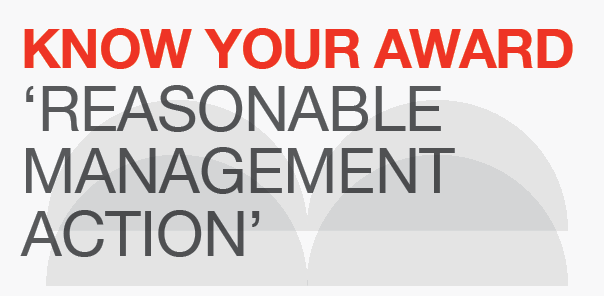What is Reasonable Management Action?

Following on from her successful webinar on ensuring your workplace is free from bullying and harassment, Merilyn Speiser explains the concept of ‘reasonable management action’, and it’s importance in relation to claims of bullying or unfair dismissal.
An employee usually won’t succeed in an unfair dismissal or bullying claim if the conduct of their employer is considered ‘reasonable management action. But what does that term mean?
What is reasonable management action? (What you can do)
The concept of ‘reasonable management action’ exists in the legislation to essentially give permission for managers and business owners to take necessary steps to ensure the business runs effectively. It acknowledges that from time to time difficult issues need to be addressed and it provides employers with the vehicle to do this without fear of a claim being made against them.
Questions of reasonable management action often centre around a management act, such as disciplinary action, a workplace investigation, a sanctioning or even a poor performance review. However, the Fair Work Commission (FWC) and other courts and tribunals have held that a whole range of activities are considered reasonable management action, including:
- Introducing a performance management system (assuming all employees are required to participate)
- Allocating work to an employee and controlling how it’s carried out
- Modifying an employee’s duties, including transferring or redeploying the employee
- Informing a worker about their unsatisfactory work performance or inappropriate work behaviour
- Providing fair and constructive feedback on a worker’s performance
- Expecting employees to achieve reasonable workplace goals and maintain workplace standards
- Requesting an independent medical examination for an employee to assess whether they’re physically fit to fulfil the requirements of the role
- Reasonable action doesn’t mean perfect action
Put simply, a whole range of management action will be considered reasonable. And something can be reasonable, even if it’s flawed.
For instance, in one case, Ms SB [2014] FWC 2014, the FWC found that to be reasonable, management action didn’t have to be ‘perfect or ideal’. It could also be reasonable when viewed as a whole, even where particular steps taken were not reasonable. It just couldn’t be unlawful or ‘irrational, absurd or ridiculous’.
In the same case, the FWC said that it only needed to consider whether the action was reasonable, not whether it could have been more reasonable, or carried out in an acceptable manner.
It also said that it was important to examine the action itself – not the employee’s perception of it.
What reasonable management action isn’t (or what you can’t do)
Perhaps equally important in solving the riddle of reasonable management action, is understanding what reasonable management action isn’t. The FWC and other tribunals have had a lot to say on that point. Things that they have held are NOT reasonable include:
- Using disciplinary procedures disproportionately, e.g. performance managing an employee just because they were late to work once or twice
- Conducting a spontaneous disciplinary meeting with no prior warning or consultation
- Standing over an employee for regular, extended periods of time to observe their work
- Berating an employee or making threats to dismiss them in front of their work colleagues
- Sending a workplace email to all staff disclosing the name and details of a poorly performing employee who has been subject to disciplinary action
- Intentionally embarrassing or belittling an employee
- Conducting an unfair workplace investigation into an alleged breach, e.g. by carrying out the process too quickly, giving a worker inadequate notice, or not affording the worker a fair opportunity to respond
- Requesting an independent medical examination for an employee just because they were off sick for a couple of days
Are your actions reasonable?
Confused? No need to be. If you want to know whether what you’re doing is reasonable you first need to step back and assess what you’re doing objectively. When you do, think about the context of what’s happened and what the people involved know and don’t know. Gather the facts, and ensure the issues are well understood.
Also, consider the employee themselves and what impact your action is likely to have on them. Remember to be hard on the issue, not on the person.
Make sure you understand your organisation’s policies and procedures well enough to be sure you are complying with them; and ensure that you carry out any investigations both fairly and in a timely manner.
And, finally, if you’re not sure whether action you or your managers have taken or plan to take is reasonable, consider them in the context of what an objective person would do, and what the outcome (including any risk of a claim) could be.
Merilyn Speiser is Principal Consultant at Catalina Consultants. This is an edited version of an article that first appeared on the Catalina Consulting blog, and is republished here with permission. Merilyn presented the September ACA 2017 webinar ‘Ensuring your workplace is free from bullying discrimination and harassment’.
